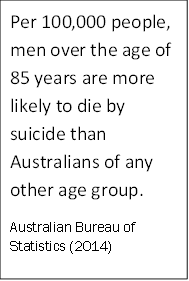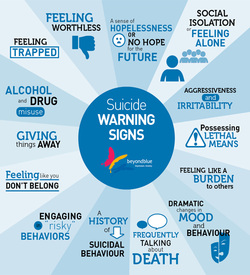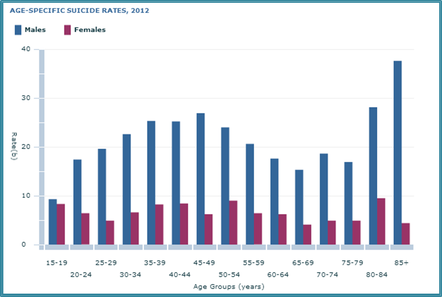|
Suicide in ageing By Jacqui Tibbits, Director Consultivation  Today is RUOK? day - a national campaign to reach out to others, to start a conversation, to check in. On this day, I would like to draw attention to suicide rates in our ageing population. Touted as a young person’s activity, the reality of suicide in older people is frightening. According to the ABS (2014) per 100,000 people, men over the age of 85 years are more likely to die by suicide than Australians of any other age group followed by men in the 80-84 year age group. Women aged 80 to 84 years have the highest rate of suicide for females from the age of 15 years onwards per 100,000 people. We can also consider these numbers are under reported as death by suicide is subject of proving intent of self-harm to cause death; regulatory barriers; it may be hidden within the mechanisms of death such as vehicle incidents or not recorded as self-harm due to the sensitivity to the feelings, cultural practices and religious beliefs of the family of the deceased. (Australian Bureau of Statistics, 2014) So, what is important? People - one simple word, one complex world.  Depression is not a normal part of ageing For older people, they may be feeling sad or miserable or lose interest in activities they usually derive pleasure from. Sometimes the signs of depression, such as isolation, lack of sleep or confusion, are seen as people “just getting older” but depression is not a normal part of ageing. Factors which may increase an older person’s risk of developing depression include:
Older people may have different stigmas attached to mental health, self-harm and suicide and use different language – they may not refer to depression or feeling sad but talk about their nerves or things not being o’kay. If this behaviour is on-going it could be a sign.  Suicide warning signs. Source: beyondblue Suicide warning signs. Source: beyondblue Signs Be aware and notice differences. People who are thinking about suicide or harming themselves will usually give some signs. They may mention it in comment or passing. It might be subtle so make sure you’re tuned in. Respond Respond to warning signs. If unsure about an incident or observation, follow your instinct and ask the question, “Are you o’kay?” “You haven’t seemed yourself lately and I’m worried about you?” “Do you intend to take your own life?” These can be tricky questions to ask and sometimes down right uncomfortable but it can be done. If you need help supporting someone else, than seek help from a doctor, family member or friend. If the possibility of self-harm is imminent call the person's doctor, mental health crisis team or emergency services on 000. Resources There are great resources freely available to help reach out to people who may be thinking about harming themselves; or for those people needing assistance in supporting others. Your local doctor is a great place to start. On-line resources include beyondblue, RUOK?, Lifeline and the Better Health Channel. Workplace Supportive workplaces are important too. Ensuring there are responsible and reactive structures in place to appropriately support people, whether this be staff, volunteers, management or clients, who are thinking about self-harming; or for supporting staff who are helping others in their life. Response and appropriate referral are important. Workplace training is a great idea and there are many organisations which can help with on-line, classroom or self-paced education models. Organisations providing work placed mental health training in Western Australia include the WA Association for Mental Health, Richmond Wellbeing and Living Works. Most importantly, ensure you and others around you stay connected, not just today but every day. Consultivation is an independent consultancy service driven by an ethical values base supporting businesses and people to flourish in the community and aged care sectors. If you would like to know how Consultivation can help you contact us today. Lifeline is available 24/7 13 11 14. References Australian Bureau of Statistics. (2014, March 25). 3303.0 - Causes of Death, Australia, 2012 - Age. Retrieved September 08, 2016, from Australian Bureau of Statistics: http://www.abs.gov.au/ausstats/[email protected]/Lookup/by%20Subject/3303.0~2012~Main%20Features~Age~10010 Australian Bureau of Statistics. (2014, March 24). 3303.0 - Causes of Death, Australia, 2012 - Explanatory Notes. Retrieved February 10, 2015, from Australian Bureau of Statistics: http://www.abs.gov.au/ausstats/[email protected]/Lookup/3303.0Explanatory+Notes12012 Better Health Channel. (2016). Depression and Ageing. Retrieved September 08, 2016, from Better Health Channel: https://www.betterhealth.vic.gov.au/health/conditionsandtreatments/depression-and-ageing Beyond Blue. (2016) Worried about suicide. Retrieved September 08, 2016 from Beyond Blue: https://www.beyondblue.org.au/the-facts/suicide-prevention/worried-about-suicide Beyond Blue. (2016) Responding to Warning Signs. Retrieved September 08, 2016 from Beyond Blue: https://www.beyondblue.org.au/the-facts/suicide-prevention/worried-about-suicide/what-are-the-warning-signs/responding-to-warning-signs RUOK?. (2016) What we’re about. Retrieved September 08, 2016 from RUOK?: https://www.ruok.org.au/about-us
7 Comments
28/9/2016 07:57:30 am
Suicide warning sign easy to understand through this blog post which you provide diagram that display are warning of this danger. I am too much excited to read out your blog post which is really helpful for all kind of safety topic. I sure your all customers are satisfied of your products because you are some extra information about safety tips and Thanks a lot for sharing this wonderful news with us.
Reply
24/11/2016 11:35:16 pm
Depression is no easy thing to deal with. It is really a serious problem that we should not take lightly especially if it happens to our elder people. We did a research a couple of year back about problems that people from 60-80 years old are dealing with and depression was first on the list. People from that age bracket are really sensitive and it can affect them so much that we need to handle it as soon as we can. This is truly a blog that I need to share to my friends.
Reply
20/12/2016 11:58:58 am
It is really a serious problem that we should not take lightly especially if it happens to our elder people. We did a research a couple of year back about problems that people from 60-80 years old are dealing with and depression was first on the list. People from that
Reply
14/1/2017 01:34:23 am
Thanks for your comment. The statistics are frightening. It is also important for people to understand depression is not a normal part of ageing.
Reply
12/1/2017 07:01:06 am
Humans have a wide range of interests and hobbies; we read different books, play different sports, engage in different conversations, and ultimately posses different convictions. R U OK? is a not-for-profit organisation whose vision is a world where we’re all connected and can help people struggling with life long before they even think about suicide.One of the great things about asking “R U Ok?” is you don’t have to know the answers to a friend’s problems. Nor do you have to be ok yourself, or feel particularly strong
Reply
Your comment will be posted after it is approved.
Leave a Reply. |
Jacqui TibbitsJacqui is a positive change management specialist with a penchant for public speaking. Susan JohnsonSusan has expertise in cognitive behaviour therapy, narrative therapy & mindfulness. Guest bloggersGuest bloggers are invited to contribute to the Consultivation blog. If you have an idea, concept or perspective you would like to share please contact Jacqui at Consultivation.
"Consultivation delivers topics skilfully and clearly."
Workshop participant "I have a better understanding of what impacts the aged care changes are going to have on our clients and business." Michelle
"Consultivation delivers topics skillfully and clearly. The knowledge gained will give me guidance in doing my job and keeping up the goodwork." Mario
"Thanks to Consultivation I understand that changes are on-going in the organisation and sector to keep clients in their homes longer."
Nancy "Due to today's training I will be more open minded with staff and pull together and ask for help to improve when needed."
Carol Archives
June 2020
Categories
All
|




 RSS Feed
RSS Feed
